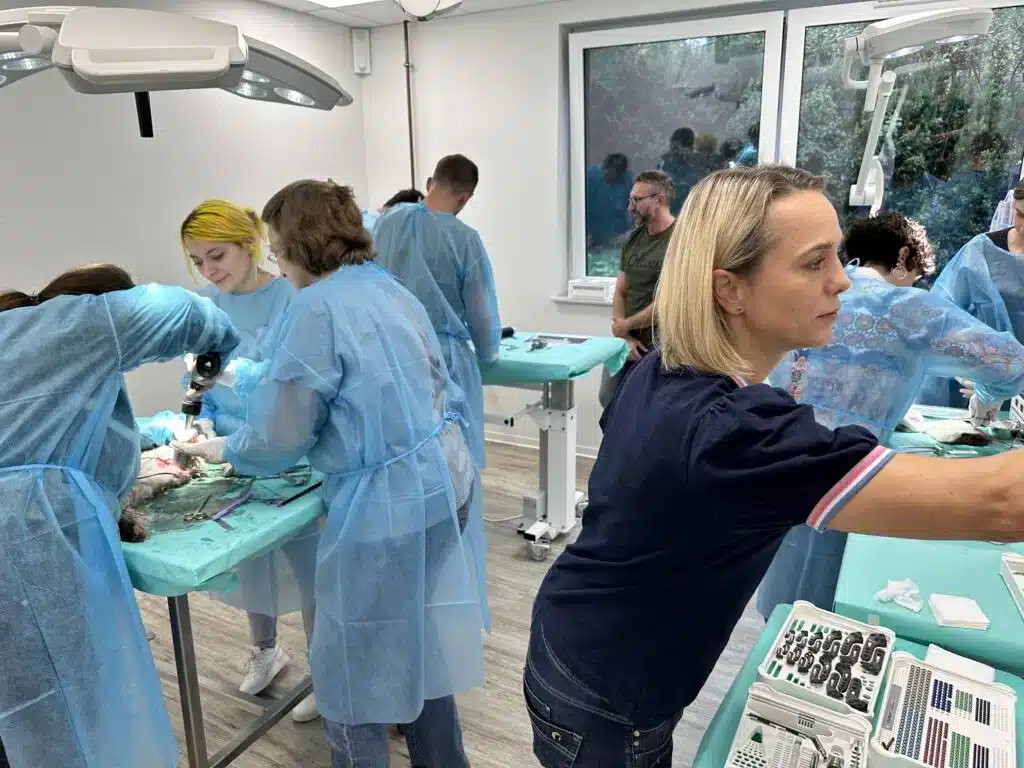- Veterinary training: Further training courses for veterinary doctors
- Overview of the training landscape
- Further training for veterinarians
- Further training for veterinary specialists
- Online seminars: flexibility and accessibility for veterinary training
- doc4pets Academy from June 2024 in Idar-Oberstein
- FAQ about veterinary training
- Summary of veterinary training courses
Veterinary training: Further training courses for veterinary doctors
Overview of the training landscape
In the dynamic world of veterinary medicine, ongoing training is an essential component for specialists. Understanding new treatment methods, updating specialist knowledge and exchanging knowledge with colleagues not only improves the quality of veterinary care, but also promotes the personal and professional development of veterinarians and veterinary assistants (TFA).
Further training for veterinarians
Our training offering is aimed at veterinarians who want to gain practical experience and deepen their knowledge in a highly specialized environment. Our courses are designed to teach participants in small groups to ensure an intensive learning atmosphere. This enables direct interaction with the lecturers and immediate application of the knowledge learned in practical exercises.
In Germany, continuous training for veterinarians and specialist veterinarians is not only a professional obligation, but also an important part of their professional development. The number of training hours to be completed varies depending on the federal state and can also differ depending on the guidelines of the respective veterinary chambers.

Continuing education hours for veterinarians
In general, veterinarians in Germany must complete a certain number of hours of training each year in order to maintain and improve their professional competence. The Academy for Continuing Veterinary Training (ATF) recommends that practicing veterinarians complete at least 20 ATF hours per year. This recommendation serves as a guideline for ongoing professional development and is used as a benchmark by many veterinary associations.
Further training hours for specialist veterinarians
Specialist veterinarians generally have higher requirements for further professional training. They are often required to complete more ATF hours per year to keep their specialized knowledge and skills current. The exact number can vary, but is usually around 40 ATF hours per year. This increased number of hours reflects the deeper expertise and specialized practice expected of specialty veterinarians.
Importance of continuous training
Continuous training enables veterinarians and veterinary specialists to stay up to date with the latest veterinary research and practice. It helps to improve the quality of veterinary care and ensure the welfare of animals. Further training can be completed in various formats, including face-to-face seminars, online courses or workshops, which enable veterinary professionals to flexibly and efficiently expand their knowledge and exchange ideas with colleagues.
In summary, it can be said that veterinarians in Germany should usually have at least 20 ATF hours and specialist veterinarians around 40 ATF hours per year for their professional training. These hours are an essential part of your professional development and contribute to quality assurance in veterinary practice. However, it is important to note the specific requirements of the relevant veterinary board, as these can vary from state to state.
Practice-oriented learning approaches
We attach great importance to the fact that our training events are practical and geared to the needs of today's veterinary medicine. The courses cover a wide range of modern surgical, therapeutic and diagnostic techniques and are led by experienced speakers from home and abroad.
Further training for veterinary specialists
The job profile of TFA is just as important and demanding as that of veterinarians. That's why we offer special seminars that are tailored to the needs and requirements of trained TFAs and trainees. These courses are designed to enable participants to expand their skills and optimize their contribution to veterinary practice.
Online seminars: flexibility and accessibility for veterinary training
Recognizing today's dynamic lifestyles, we have developed a comprehensive range of online seminars. These enable participants to access high-quality training resources from anywhere and at any time, without compromising the quality of the face-to-face events.
Digital workshops: Interactive and case-based learning in veterinary training
Our digital workshops are an innovation in our program and offer an interactive learning environment. In these workshops the focus is on case discussions, practical examples and exchange with each other. They enable participants to learn immediately applicable solutions and techniques for the challenges in their everyday professional life.
doc4pets Academy from June 2024 in Idar-Oberstein
From June 2024, the veterinary training new courses in Idar-Oberstein. These courses are specifically designed for veterinary professionals who want to expand their knowledge and keep up to date with the latest advances in veterinary practice. The training courses are practice-oriented and cover various aspects of veterinary medicine. They offer an ideal opportunity for professionals to improve their skills and network with colleagues. Further details and the full range of courses can be found on the official website .
Examples of our speakers - Univ.Prof. Dr. Haithem Farghali
We are particularly pleased to have won Prof. Farghali for our courses in Idar-Oberstein.

Haithem Farghali is a recognized veterinarian and professor of surgery, anesthesiology and radiology at the Faculty of Veterinary Medicine, Cairo University, Egypt. He began his academic career in 1998 as a demonstrator and rose through the positions of assistant lecturer and lecturer to assistant professor before being appointed professor in 2017. In his impressive academic career, he has published 94 research articles and supervised 28 master's and 13 doctoral theses.
In his professional life, Farghali is the owner of the Alpha Vet clinic chain and, since 2017, an advisor to the Department for the Training of Security and Guard Dogs at the Police Academy of the Egyptian Interior Ministry. He previously worked as a consultant for the training center for security and guard dogs from 2007 to 2014 and since 2021 he has been a consultant at the Faculty of Veterinary Medicine at Bader University in Cairo. He also works as a speaker for the animal health company Zoetis in Egypt.
Farghali has conducted numerous courses and practical workshops at the Faculty of Veterinary Medicine in the areas of basic and advanced surgery, ultrasound examination and soft tissue surgery for small animals.
He is also involved in various surgical areas of veterinary medicine, such as orthopedics, stem cell therapy for neurological diseases, platelet-rich plasma in wound healing and the application of nanogold in breast cancer research. He is currently part of the research team of Professor Dr. Mostafa Elsaid, which deals with the treatment of mammary tumors in dogs and cats using plasmonic photothermy.
FAQ about veterinary training
Why are veterinary training important?
Further training is essential to stay up to date with the latest veterinary research and technology. They enable veterinarians to continually expand their expertise, improve the quality of veterinary care and contribute to the well-being of animals. Through regular training, veterinarians can learn about innovative treatment methods and sharpen their diagnostic and therapeutic skills.
How often should veterinarians attend continuing education courses?
It is recommended that veterinarians attend continuing education courses annually to maintain their license and ensure their professional competence. The exact number of hours varies by state and chamber, but generally a guideline of 20 to 40 hours per year is considered reasonable.
What types of training are there for veterinarians?
There are a variety of training options available, including face-to-face seminars, online courses, workshops and specialized conferences. Topics range from general veterinary medicine, specialized areas such as orthopedics or cardiology, to practice management and soft skills.
How can I find the right training for me?
Consider your areas of expertise, interests and career goals. Many organizations and platforms offer detailed course catalogs. Exchanging ideas with colleagues or visiting trade fairs can also be helpful in order to gain insights into relevant and current training topics.
Are online training courses just as valuable as face-to-face events?
Online training offers flexibility and accessibility and is particularly valuable for veterinarians with limited time. They can be just as informative and enriching as face-to-face events, provided they come from recognized providers and contain interactive elements and up-to-date content.
Summary of veterinary training courses
Participation in veterinary training is crucial for every veterinarian in order to stay up to date with the latest veterinary medicine. Through regular veterinary training, knowledge can be continuously expanded and deepened.
The doc4pets Academy in particular offers a variety of veterinary training courses that are specifically aimed at expanding practical and theoretical knowledge. Veterinary training courses offered by the doc4pets Academy are characterized by high quality and topicality. Every veterinary training course conducted by the doc4pets Academy is aimed at providing veterinarians with the latest specialist knowledge and innovative treatment methods.
By taking part in veterinary training at the doc4pets Academy, veterinarians can not only increase their professional competence, but also expand their professional network. Veterinary training is therefore an indispensable part of professional development and guarantees that veterinarians can treat their patients according to the latest scientific findings.
The doc4pets Academy supports veterinarians in maintaining and further expanding their professional qualifications through targeted veterinary training. Overall, veterinary training offers an excellent opportunity to develop professionally, and the doc4pets Academy is the ideal partner to achieve this goal.
